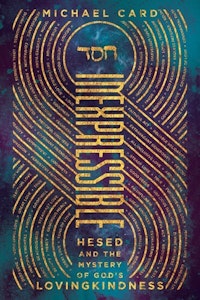Introductory Note:
Michael Card spent nearly a decade exploring the layers of meaning in the Hebrew word hesed. One aspect of hesed that Card uncovers is the vulnerability that God willingly takes on in order to share his life with us. This feels particularly relevant as we consider the birth of Christ. What incredible vulnerability! In this excerpt from Card’s book Indescribable, I was moved by the idea that God “hopes that our response to his hesed will be an infinitely smaller, yet still indescribable, expression of our own hesed.” This idea is something to ponder as we open our lives to others, becoming vulnerable by extending mercy, presence, and blessing “with no strings attached.”
Renovaré Team
 Excerpt from Inexpressible
Excerpt from Inexpressible
The Bible reveals the God of hesed, who has opened the door of his life to you and me. Though we are responsible for the death of his only Son and have, in effect, cursed him, he covered us with his body, his blood, and saved us long before we might have accepted him. We have no right to expect anything from him, the Holy One. Yet he has extended himself to us, has invited us to enter his world, has made our story a part of his story, has opened his life to the inevitable possibility of being hurt, disappointed, and wounded by you and me.
The story is repeated again and again in Scripture. God invites Adam and Eve into his life, only to be wounded by their willingness to believe Satan over him. He extends himself to the Israelites, to Moses, and to David, only to be rejected, to be hurt by their stubborn disbelief. “How long will these people despise me?” God whispers to Moses in Numbers 14:11. “What fault did your fathers find in me?” he laments in Jeremiah 2:5. Ultimately, in Jesus of Nazareth he extends himself, personally and intimately, calls us friends, is vulnerable, only to be wounded, abandoned, and crucified, when at any moment he might have disappeared over the hill into the vast hiding place of the Judean desert.
Though we had no right to expect anything from him, he freely gave us everything. At the heart of this relentless and extravagant act of God himself, central to the indescribable mystery of the opening of the door of his life, is the Hebrew word hesed. When God definitively reveals himself to Moses, the word is twice upon his lips. When he reaches out to David, it is the word on which their relationship and David’s throne rest. The psalmists sing about it. The prophets lament its fragileness in us. And God himself hopes that our response to his hesed will be an infinitely smaller, yet still indescribable, expression of our own hesed. Jesus will expand on it in his parables and incarnate it in his own life.
This small three-letter word, חסד, seems to always be there when the door is open from one life to another, when the unexpected and undeserved gift of one’s life is offered with no strings attached, when inexpressible acts of adoption, forgiveness, and courage occur that leave us speechless.
Taken from Inexpressible by Michael Card. Copyright © 2018 by Michael Card. Published by InterVarsity Press, Downers Grove, IL. www.ivpress.com
Text First Published December 2018 · Last Featured on Renovare.org December 2021


